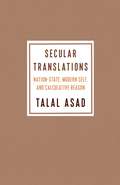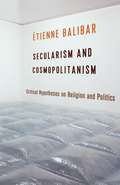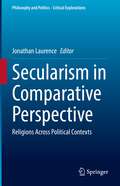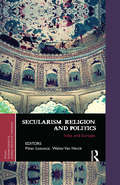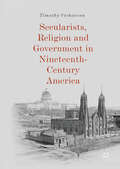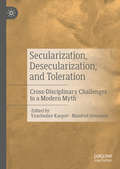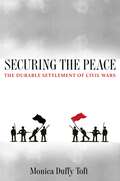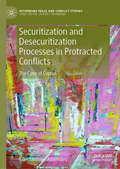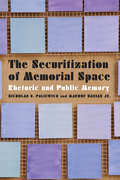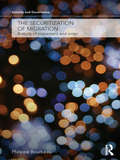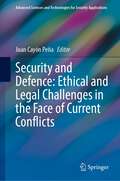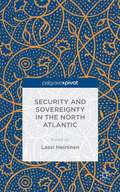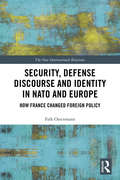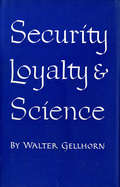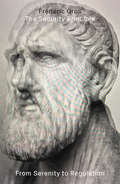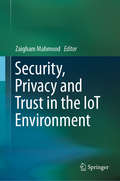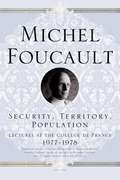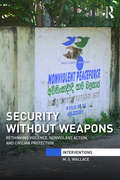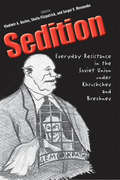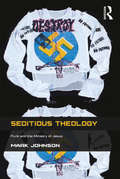- Table View
- List View
Secular Translations: Nation-State, Modern Self, and Calculative Reason (Ruth Benedict Book Series)
by Talal AsadIn Secular Translations, the anthropologist Talal Asad reflects on his lifelong engagement with secularism and its contradictions. He draws out the ambiguities in our concepts of the religious and the secular through a rich consideration of translatability and untranslatability, exploring the circuitous movements of ideas between histories and cultures.In search of meeting points between the language of Islam and the language of secular reason, Asad gives particular importance to the translations of religious ideas into nonreligious ones. He discusses the claim that liberal conceptions of equality represent earlier Christian ideas translated into secularism; explores the ways that the language and practice of religious ritual play an important but radically transformed role as they are translated into modern life; and considers the history of the idea of the self and its centrality to the project of the secular state. Secularism is not only an abstract principle that modern liberal democratic states espouse, he argues, but also a range of sensibilities. The shifting vocabularies associated with each of these sensibilities are fundamentally intertwined with different ways of life. In exploring these entanglements, Asad shows how translation opens the door for—or requires—the utter transformation of the translated. Drawing on a diverse set of thinkers ranging from al-Ghazālī to Walter Benjamin, Secular Translations points toward new possibilities for intercultural communication, seeking a language for our time beyond the language of the state.
Secularism and Cosmopolitanism: Critical Hypotheses on Religion and Politics (European Perspectives: A Series in Social Thought and Cultural Criticism)
by Étienne BalibarWhat is the relationship between cosmopolitanism and secularism—the worldwide and the worldly? While cosmopolitan politics may seem inherently secular, existing forms of secularism risk undermining the universality of cosmopolitanism because they privilege the European tradition over all others and transform particular historical norms into enunciations of truth, valid for all cultures and all epochs. In this book, the noted philosopher Étienne Balibar explores the tensions lurking at this troubled nexus in order to advance a truly democratic and emancipatory cosmopolitanism, which requires a secularization of secularism itself.Balibar argues for the idea of the universal against its particular dominant institutions. He questions the assumptions that underlie popular ideas of secularism and religion and outlines the importance of a new critique for the contemporary world. Balibar holds that conflicts between religious and secular discourses need to be reframed from a point of view that takes into account the cultural hybridization, migration and mobility, and transformation of borders that have reshaped the postcolonial age. Among the topics discussed are the uses and misuses of the category of religion and the religious, the paradoxical genealogy of monotheism, French laïcité’s identitarian turn, and the implications of the responses to the Charlie Hebdo attacks for an extended definition of free speech. Going beyond circumscribed notions of religion and the public sphere, Secularism and Cosmopolitanism is a profound rethinking of identity and difference that seeks to make room for a renewed political imagination.
Secularism and Freedom of Conscience
by Jocelyn Maclure Charles TaylorSecularism: the definition of this word is as practical and urgent as income inequalities or the paths to sustainable development. In this wide-ranging analysis, Jocelyn Maclure and Charles Taylor provide a clearly reasoned, articulate account of the two main principles of secularism—equal respect, and freedom of conscience—and its two operative modes—separation of Church (or mosque or temple) and State, and State neutrality vis-à-vis religions. But more crucially, they make the powerful argument that in our ever more religiously diverse, politically interconnected world, secularism, properly understood, may offer the only path to religious and philosophical freedom. Secularism and Freedom of Conscience grew out of a very real problem—Quebec’s need for guidelines to balance the equal respect due to all citizens with the right to religious freedom. But the authors go further, rethinking secularism in light of other critical issues of our time. The relationship between religious beliefs and deeply-held secular convictions, the scope of the free exercise of religion, and the place of religion in the public sphere are aspects of the larger challenge Maclure and Taylor address: how to manage moral and religious diversity in a free society. Secularism, they show, is essential to any liberal democracy in which citizens adhere to a plurality of conceptions of what gives meaning and direction to human life. The working model the authors construct in this nuanced account is capacious enough to accommodate difference and freedom of conscience, while holding out hope for a world in which diversity no longer divides us.
Secularism, Identity, and Enchantment
by Akeel BilgramiBringing clarity to a subject clouded by polemic, Secularism, Identity, and Enchantment is a rigorous exploration of how secularism and identity emerged as concepts in different parts of the modern world. At a time when secularist and religious worldviews appear irreconcilable, Akeel Bilgrami strikes out on a path distinctly his own, criticizing secularist proponents and detractors, liberal universalists and multicultural relativists alike.<P><P> Those who ground secularism in arguments that aspire to universal reach, Bilgrami argues, fundamentally misunderstand the nature of politics. To those, by contrast, who regard secularism as a mere outgrowth of colonial domination, he offers the possibility of a more conceptually vernacular ground for political secularism. Focusing on the response to Salman Rushdie's Satanic Verses, Bilgrami asks why Islamic identity has so often been a mobilizing force against liberalism, and he answers the question with diagnostic sympathy, providing a philosophical framework within which the Islamic tradition might overcome the resentments prompted by its colonized past and present.<P> Turning to Gandhi's political and religious thought, Bilgrami ponders whether the increasing appeal of religion in many parts of the world reflects a growing disillusionment not with science but with an outlook of detachment around the rise of modern science and capitalism. He elaborates a notion of enchantment along metaphysical, ethical, and political lines with a view to finding in secular modernity a locus of meaning and value, while addressing squarely the anxiety that all such notions hark back nostalgically to a time that has past.
Secularism in Comparative Perspective: Religions Across Political Contexts (Philosophy and Politics - Critical Explorations #23)
by Jonathan LaurenceThis book confronts the key questions surrounding comparative secularism in historical perspective. The contributions critically consider the normative ideas and alternative political arrangements that govern religion’s relation to politics and to the public and private spheres. Containing contributions by world-renowned scholars such as Michael Walzer, Asma Afsaruddin and Sudipta Kaviraj, this book recounts the arguments, debates, and disputations regarding secular arguments for accommodating religion. It does so in both critical and appreciative ways and describes some of the outcomes in actually existing institutions, policies, and practical arrangements. With the addition of many non-Western experiences and viewpoints on how secularism is theorized and lived, politically and historically and from Europe and Asia to Africa and the Americas, this volume is of great value political philosophers across the globe.
Secularism, Islam and Modernity
by M T Ansari Syed Alam KhundmiriSyed Alam Khundmiri (1922-83) was an important intellectual figure of his times, a true humanist with rare philosophical insights ranging over a wide field. The volume brings together Khundmiri's seminal essays which set out his dominant concerns: Marxism, with its indifference to questions of minorities in nationalism; existentialism, which he saw as being closed off to the problems of community; and Islam, which he examined in relation to history and notions of time and change. Overall, this absorbing collection of essays encapsulates Khundmiri's dual project of situating Islam in the modern context and scrutinizing the modern in the light of Islam. Particularly relevant in the present context of the increasing sacralization of politics, it will be read with great interest by students and scholars of philosophy, history, sociology, Islamic studies, Marxism, comparative religion, cultural studies, and political and social theory, as well as by the aware and concerned lay reader.
Secularism, Religion, and Politics: India and Europe (Ethics, Human Rights and Global Political Thought)
by Péter Losonczi Walter Van HerckThis book highlights the relationship between the state and religion in India and Europe. It problematizes the idea of secularism and questions received ideas about secularism. It also looks at how Europe and India can learn from each other about negotiating religious space and identity in this globalised post-9/11 world.
Secularists, Religion and Government in Nineteenth-Century America
by Timothy VerhoevenThis book shows how, through a series of fierce battles over Sabbath laws, legislative chaplains, Bible-reading in public schools and other flashpoints, nineteenth-century secularists mounted a powerful case for a separation of religion and government. Among their diverse ranks were religious skeptics, liberal Protestants, members of minority faiths, labor reformers and defenders of slavery. Drawing on popular petitions to Congress, a neglected historical source, the book explores how this secularist mobilization gathered energy at the grassroots level. The nineteenth century is usually seen as the golden age of an informal Protestant establishment. Timothy Verhoeven demonstrates that, far from being crushed by an evangelical juggernaut, secularists harnessed a range of cultural forces—the legacy of the Revolutionary founders, hostility to Catholicism, a belief in national exceptionalism and more—to argue that the United States was not a Christian nation, branding their opponents as fanatics who threatened both democratic liberties as well as true religion.
Secularization, Desecularization, and Toleration: Cross-Disciplinary Challenges to a Modern Myth
by Vyacheslav Karpov Manfred SvenssonThis book challenges the modern myth that tolerance grows as societies become less religious. The myth inseparably links the progress of toleration to the secularization of modern society. This volume scrutinizes this grand narrative theoretically and empirically, and proposes alternative accounts of the varied relationships between diverse interpretations of religion and secularity and multiple secularizations, desecularizations, and forms of toleration. The authors show how both secular and religious orthodoxies inform toleration and persecution, and how secularizations and desecularizations engender repressive or pluralistic regimes. Ultimately, the book offers an agency-focused perspective which links the variation in toleration and persecution to the actors of secularization and desecularization and their cultural programs.
Securing the Peace: The Durable Settlement of Civil Wars
by Monica Duffy ToftTimely and pathbreaking, Securing the Peace is the first book to explore the complete spectrum of civil war terminations, including negotiated settlements, military victories by governments and rebels, and stalemates and ceasefires. Examining the outcomes of all civil war terminations since 1940, Monica Toft develops a general theory of postwar stability, showing how third-party guarantees may not be the best option. She demonstrates that thorough security-sector reform plays a critical role in establishing peace over the long term. Much of the thinking in this area has centered on third parties presiding over the maintenance of negotiated settlements, but the problem with this focus is that fewer than a quarter of recent civil wars have ended this way. Furthermore, these settlements have been precarious, often resulting in a recurrence of war. Toft finds that military victory, especially victory by rebels, lends itself to a more durable peace. She argues for the importance of the security sector--the police and military--and explains that victories are more stable when governments can maintain order. Toft presents statistical evaluations and in-depth case studies that include El Salvador, Sudan, and Uganda to reveal that where the security sector remains robust, stability and democracy are likely to follow. An original and thoughtful reassessment of civil war terminations, Securing the Peace will interest all those concerned about resolving our world's most pressing conflicts.
Securities Against Misrule
by Jon ElsterElster proposes a normative theory of collective decision making, inspired by Jeremy Bentham but not including his utilitarian philosophy. The central proposal is that in designing democratic institutions one should reduce as much as possible the impact of self-interest, passion, prejudice and bias on the decision makers, and then let the chips fall where they may. There is no independently defined good outcome that institutions can track, nor is there any way of reliably selecting good decision makers. In addition to a long initial chapter that surveys theories of collective decision making, notably social choice theory, and a chapter expounding and discussing Bentham's views, historical chapters on the jury, constituent assemblies and electoral systems develop and illustrate the main ideas. This work draws on a welter of case studies and historical episodes, from Thucydides and Plutarch to the present. It is also grounded in psychology, behavioral economics and law.
Securitization and Desecuritization Processes in Protracted Conflicts: The Case of Cyprus (Rethinking Peace and Conflict Studies)
by Constantinos AdamidesUsing the Cyprus conflict as a case study, this book examines how the securitization process in protracted conflict environments changes, as it becomes routinized and potentially even institutionalized. Furthermore, the process is not limited to the mainstream top-down path, as it also follows a horizontal and even bottom-up direction, which inevitably has an impact on the goals and securitization options of both the mainstream securitizing actors and the audience(s). Lastly, on a theoretical level it examines how the multi-directional securitization forces have an impact on the elite and audience-driven desecuritization efforts and ultimately on the prospects for conflict resolution. The book’s case study, the Cyprus question, offers an alternative reading of the forces dominating the specific conflict, while concurrently offers a useful framework for the study of similar protracted and deeply securitized conflicts.
The Securitization of Memorial Space: Rhetoric and Public Memory
by Nicholas S. Paliewicz Marouf Hasian Jr.The Securitization of Memorial Space argues that the National September 11 Memorial and Memorial Museum is a securitized site of memory—what Foucault called a dispositif—that polices visitors and publics to remember trauma, darkness, and victimage in ways that perpetuate the “necessity” of the Global War on Terrorism. Contributing to studies in public memory, rhetoric and argumentation, and critical security studies, Nicholas S. Paliewicz and Marouf Hasian Jr. show how various human and nonhuman actors participated in complicated argumentative formations that have mobilized political, performative, and militaristic practices of anti-terroristic violence in other parts of the world. While there were times that certain argumentative stakeholders—such as local New Yorkers—questioned the necessity of securitizing this site of memory, agentic factions including the families of those who died on 9/11, public supporters, security agents, and politicians created an ideologically oriented security assemblage that remembers 9/11 through counter-terroristic performances at Ground Zero. In chronological order from the 2001 “dustbowl” to the present popularization of 9/11 memories, the authors present seven chapters of rich rhetorical analysis that show how the National September 11 Memorial and Memorial Museum perpetuates grief, uncertainty, and angst that affects public memory in multidirectional ways.
The Securitization of Migration: A Study of Movement and Order (Security and Governance)
by Philippe BourbeauThe international movement of people is provoking worldwide anxiety and apprehension. Nation-states around the globe, especially Western ones, are cracking down on migration for security reasons. International migration has become a key security issue and is perceived, by some, as an existential security threat. The Securitization of Migration is about the movement of people and the system of order underpinning the movement. In undertaking a comparative study of Canada and France, the study analyzes the process of securitizing migration. It explores the process of discursively and institutionally integrating international migration into security frameworks that emphasize policing and defence. Drawing upon social theory, migration studies, and Securitization Theory, Philippe Bourbeau seeks to understand the concepts of power underlying security frameworks and how these affect the treatment of migrants and immigrants. This book is one of the first to systematically and comparatively examine the role of political agents, media agents, and contextual factors in the process of securitizing migration. The book will be of interest to students and scholars concerned with comparative and theoretical approaches to security and migration studies.
Security and Defence: Ethical and Legal Challenges in the Face of Current Conflicts (Advanced Sciences and Technologies for Security Applications)
by Juan Cayón PeñaThis book aspires to face the challenge of analyzing with due academic rigor, always in the paradigm of security and advanced sciences, but without forgetting the ethical questions that our world raises every day. The work is divided into two main sections: the first section is focused on the cyber world, with not only technical but also legal derivations given the expansion of vulnerabilities and our technological dependence. The second section, with a more interdisciplinary nature, runs through undeniably topical issues such as territorial problems and the potential decline of the traditional States, the communicational impact of information management and false news, or the commitment to essential freedoms for the West. This book connects advanced technologies and ethical issues and includes discussions on recent crises such as COVID-19. It also provides an interdisciplinary view on the ethical issues for security technologies.
Security and Sovereignty in the North Atlantic
by Lassi HeininenThe North Atlantic continues to be an area of international strategic significance regionally and globally. This study explores the strong processes of sovereignty, as well as new independent states and micro-proto-states that are forming in the region.
Security, Defense Discourse and Identity in NATO and Europe: How France Changed Foreign Policy (New International Relations)
by Falk OstermannAnalyzing changes in the role and place of NATO, European integration, and Franco-American relations in foreign policy discourse under Presidents Jacques Chirac and Nicolas Sarkozy, this book provides an original perspective on French foreign policy and its identity construction. The book employs a novel research design for the analysis of foreign policies, which can be used beyond the case of France, by combining the discourse theory of the Essex School with Interpretive Policy Analysis to examine political ideas and how they are organized into a foreign policy identity. On these grounds, the volume undertakes a comparative analysis of parliamentary and executive discourse of President Chirac’s failed attempt at NATO reintegration in the 1990s, Sarkozy’s successful attempt in the 2000s, and the Libyan War. Ostermann depicts French foreign policy and identity as turning away from the European Union, atlanticizing, and losing its American nemesis. As a result, France uses a much more pragmatic, de-unionized, and pro-American strategy to implement foreign policy objectives than before. Offering a new and innovative explanation for a major change in French foreign policy and grand strategy, this book will be of great interest to scholars of NATO, European defense cooperation, and foreign policy.
Security, Loyalty, and Science (Cornell Studies in Civil Liberties)
by Walter GellhornBoth sides of a sensitive problem are assessed by Professor Gellhorn in this penetrating analysis of national security and its effect upon scientific progress.The costs and advantages of secrecy in certain areas of science and the conflict between national safety and individual rights in the administration of our federal loyalty program are presented; all the arguments are objectively weighed. The book answers such questions as: Can young scientists be well trained when publication and teaching are not free? Have we gone far enough-or too far-in avoiding "security risks" in important scientific establishments? How does the federal drive against "potentially disloyal" persons actually work? Do "fear of the smear" and crude methods discourage public service by American scientists?This study, a unit of an investigation of control of subversive activities supported by grants from the Rockefeller Foundation, is based upon two years of research and numerous field interviews of scientists, administrators, defense officials, and educators. Security, Loyalty, and Science is a volume in the series Cornell Studies in Civil Liberty, of which Robert E. Cushman is advisory editor.
The Security Principle: From Serenity to Regulation
by Frederic GrosThe genealogy of the idea of security from ancient Greece to the war on terrorismIn The Security Principle, French philosopher Frédéric Gros takes a historical approach to the concept of "security", looking at its evolution from the Stoics to the social network. With lucidity and rigour, Gros's approach is fourfold, looking at security as a mental state, as developed by the Greeks; as an objective situation and absence of all danger, as prevailed in the Middle Ages; as guaranteed by the nation state and its trio of judiciary, police and military; and finally "biosecurity", control, regulation and protection in the flux of contemporary society. In this deeply thought-provoking account, Gros's exploration of security shines a light both on its past meanings as well as its present uses, exposing the contemporary abuses of security and the pervasiveness of it in everyday life in the Global North.
Security, Privacy and Trust in the IoT Environment
by Zaigham MahmoodThe Internet of Things (IoT) is a network of devices and smart things that provides a pervasive environment in which people can interact with both the cyber and physical worlds. As the number and variety of connected objects continue to grow and the devices themselves become smarter, users’ expectations in terms of adaptive and self-governing digital environments are also on the rise. Although, this connectivity and the resultant smarter living is highly attractive to general public and profitable for the industry, there are also inherent concerns. The most challenging of these refer to the privacy and security of data, user trust of the digital systems, and relevant authentication mechanisms. These aspects call for novel network architectures and middleware platforms based on new communication technologies; as well as the adoption of novel context-aware management approaches and more efficient tools and devices.In this context, this book explores central issues of privacy, security and trust with regard to the IoT environments, as well as technical solutions to help address them. The main topics covered include:• Basic concepts, principles and related technologies• Security/privacy of data, and trust issues• Mechanisms for security, privacy, trust and authentication• Success indicators, performance metrics and future directions.This reference text is aimed at supporting a number of potential audiences, including• Network Specialists, Hardware Engineers and Security Experts • Students, Researchers, Academics and Practitioners.
Security, Territory, Population: Lectures At The College De France, 1977-1978
by Michel FoucaultMarking a major development in Foucault's thinking, this book takes as its starting point the notion of "biopower," studying the foundations of this new technology of power over populations.
Security Without Weapons: Rethinking violence, nonviolent action, and civilian protection (Interventions)
by M. S. WallaceFew questions of global politics are more pressing than how to respond to widespread violence against civilians. Despite the efforts of Responsibility to Protect (R2P) proponents to draw attention away from exclusively military responses, debates on humanitarian intervention and R2P’s “Third Pillar” still tend to boil down to two unsatisfying options: stand by and “do nothing” or take military action to protect civilians – essentially using violence to stop violence. Accordingly – and given disagreement and uncertainty regarding moral claims, as well as the unpredictability of military effectiveness – this book asks: how can we counter violence ethically and effectively, taking action consistent with our particular moral commitments while also nurturing difference and enacting responsibility towards multiple others? After evaluating the pragmatic and ethical failings of military action, the book proposes nonviolent intervention as a third – unarmed, on-the-ground – option for protecting civilians during humanitarian crises. In the empirical section of the book, focusing on the discursive and psychological conditions enabling violence, Wallace analyses the mechanisms by which Nonviolent Peaceforce – an international NGO engaged in nonviolent intervention/ unarmed civilian peacekeeping (UCP) – was able to protect civilians and prevent violence, even if on a limited scale, in the broader context of Sri Lanka’s war/counterinsurgency in 2008. Both philosophically innovative and practically useful to those working in the field, the book contributes to a range of literatures and debates: from just war theory and poststructuralist ethics to nonviolent action and conflict transformation, and from humanitarian intervention, R2P, and civilian protection to strategic theory and discursive and psychological theories of violence.
Security Without Weapons: Rethinking violence, nonviolent action, and civilian protection (Interventions)
by M. S. WallaceFew questions of global politics are more pressing than how to respond to widespread violence against civilians. Despite the efforts of Responsibility to Protect (R2P) proponents to draw attention away from exclusively military responses, debates on humanitarian intervention and R2P’s “Third Pillar” still tend to boil down to two unsatisfying options: stand by and “do nothing” or take military action to protect civilians – essentially using violence to stop violence. Accordingly – and given disagreement and uncertainty regarding moral claims, as well as the unpredictability of military effectiveness – this book asks: how can we counter violence ethically and effectively, taking action consistent with our particular moral commitments while also nurturing difference and enacting responsibility towards multiple others?After evaluating the pragmatic and ethical failings of military action, the book proposes nonviolent intervention as a third – unarmed, on-the-ground – option for protecting civilians during humanitarian crises. In the empirical section of the book, focusing on the discursive and psychological conditions enabling violence, Wallace analyses the mechanisms by which Nonviolent Peaceforce – an international NGO engaged in nonviolent intervention/ unarmed civilian peacekeeping (UCP) – was able to protect civilians and prevent violence, even if on a limited scale, in the broader context of Sri Lanka’s war/counterinsurgency in 2008.Both philosophically innovative and practically useful to those working in the field, the book contributes to a range of literatures and debates: from just war theory and poststructuralist ethics to nonviolent action and conflict transformation, and from humanitarian intervention, R2P, and civilian protection to strategic theory and discursive and psychological theories of violence.
Sedition: Everyday Resistance in the Soviet Union under Khrushchev and Brezhnev
by Sheila Fitzpatrick Vladimir A. Kozlov Sergei V. Mironenko Olga LivshinThis book explores Soviet prosecution records to tell the hidden story of ordinary citizens who were arrested for expressing discontent during the Khrushchev and Brezhnev years.
Seditious Theology: Punk and the Ministry of Jesus
by Mark JohnsonSeditious Theology explores the much analysed British punk movement of the 1970s from a theological perspective. Imaginatively engaging with subjects such as subversion, deconstruction, confrontation and sedition, this book highlights the stark contrasts between the punk genre and the ministry of Jesus while revealing surprising similarities and, in so doing, demonstrates how we may look at both subjects in fresh and unusual ways. Johnson looks at both punk and Jesus and their challenges to symbols, gestures of revolt, constructive use of conflict and the shattering of relational norms. He then points to the seditious pattern in Jesus' life and the way it can be discerned in some recent trends in theology. The imaginative images that he creates provide a challenging image of Jesus and of those who have relooked radically in recent years at what being a ’seditious’ follower of Christ means for the church. Introducing both a new partner for theological conversation and a fresh way of how to go about the task, this book presents a powerful approach to exploring the life of Christ and a new way of engaging with both recent theological trends and the more challenging expressions of popular culture.
